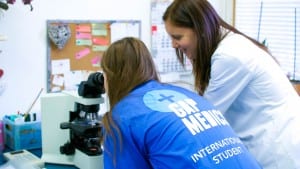
What is allied health and is it an ‘alternative’ to medicine?
Doctors, nurses, midwives and dentists are often the main careers that come to mind when you think of a career in health. And it’s hardly surprising when thousands of students start studying in these fields every year, with competition for places getting fiercer and fiercer.
In reality, though, there are hundreds of other roles within the healthcare system, all integral to the smooth running of hospitals, surgeries and clinics. These are called ‘allied health’ roles, because they work in alliance with the core hospital staff.
What are some allied health roles?
There are many different allied health careers – here are just a few:
- Pharmacist
- Phlebotomist
- Radiographer
- Physiotherapist
- Social Worker
- Lab Technician
- Dental Hygienist
- Speech and Language Therapist
- Paramedic
- Podiatrist
Many work in conjunction with doctors and nurses, sometimes in the same wards, and perform specific tasks or treat specific conditions. For example, a phlebotomist will take blood tests, a radiographer will take images such as X-Rays and scans, and a paramedic will work in emergency rooms and other locations to provide support to patients who have come in for anything from a heart attack to a broken ankle.
So are they an ‘alternative’ to a career in medicine?
There is no simple answer to this question – it depends entirely on why you want to go into healthcare and what you had in mind for your career after you graduate.
On the one hand, some allied health professions are easier to get into than medicine, nursing or dentistry. This is either because the entry requirements are lower, or because less people want to go into this field and so competition is not as high. If you are interested in a medical career but know you would like to specialise almost straight away, they can be a great way of gaining access to the field that you love without the commitment of a medicine degree.
On the other hand, this does not automatically mean that a career in allied health is easier in the long run or that it is less stressful than becoming a doctor. Being a paramedic, for instance, is extremely fast-paced and frantic, attracting only those who can handle it. Many other allied health careers require you to specialise or train for just as long as general medicine – becoming an osteopath, for instance, will mean you train for between four and five years, and many sectors say that they keep learning as their field evolves. These should not be considered as ‘easy’ options for students who did not get the grades for medical school.
Is work experience still important?
Applicants to allied health, medicine or anything else besides should try to maximise their chances of being accepted onto their chosen course. That’s why it’s so important to give your application the edge by completing some work shadowing. Nobody expects you to have delivered a baby in the back of an ambulance, but spending some time in a hospital environment shows that you understand what your future career really entails.
At Gap Medics we know that finding these placements can be hard for any medical role, let alone ones that are less common. That’s why we have recently introduced four new programmes in allied health: paramedic science, physiotherapy, radiography and laboratory science. Whether you come to one of our partner hospitals for six weeks or just one, we can guarantee that you’ll leave with a better understanding of your chosen role and whether it’s right for you.
To find out more, visit Gap Medics’ dedicated allied health page.
Uploaded by Gap Medics on X August, 2016
